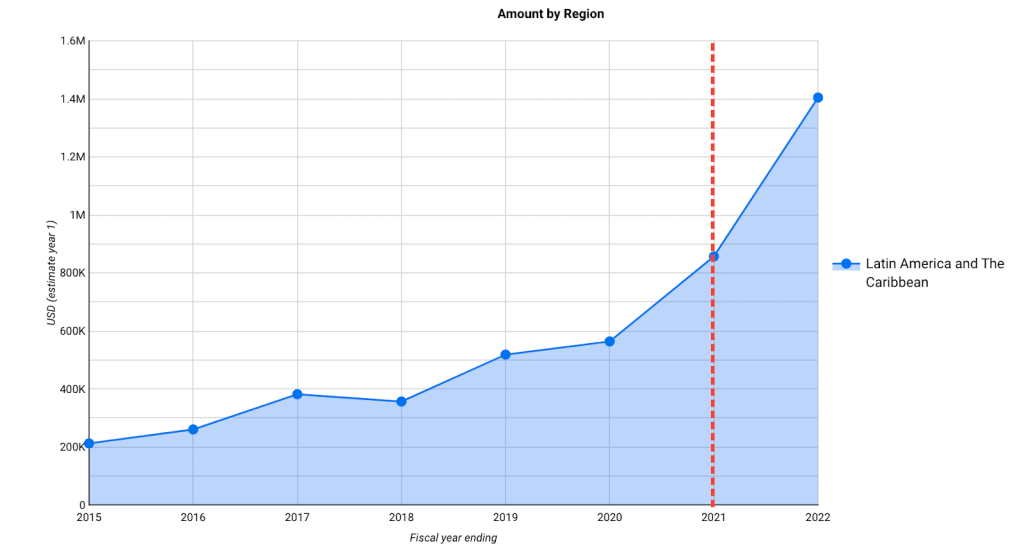
With 8% of the global population and 9% of global internet users, the Latin America and Caribbean region were one of the first areas of the movement that began collaborating together with a regional focus. This region provides us with several lessons about how we can coordinate better together across a region.
Learning Sessions
We are all part of a global movement that spans regions, languages and communities. This year, as part of the Wikimedia Foundation Annual Plan, we introduced a focus on regional work as part of the Foundation’s own commitment to advancing knowledge equity and supporting movement strategy. This regional focus will allow the Foundation to better understand localized needs and regional trends as part of our work.
We launched this new approach at the beginning of this fiscal year by improving our coordination on a regional level. Foundation teams working in the regions and partnering with local communities now convene more intentionally around defining the impact that is possible for us to make together in different regions of the world.
Each quarter, we will meet to discuss regional and historical trends and activities by individual volunteers, Chapters, User Groups, Thematic Organizations, partners organizations in the free knowledge ecosystem. These sessions are an important check-in as part of our Annual Plan, and look at planned work by various teams at the Foundation to prioritize and align resources for focused results and more impactful partnerships.
Here are our learnings for Latin America and the Caribbean.
Wikimedia in LAC
Affiliates
The Latin American and Caribbean community has been developing projects for over a decade. In numbers, the 42 countries across Latin America and the Caribbean represent 38,000 unique active editors, 7% percent of the global total. There is still room to grow and bring more diverse representation to the region.
The region has five chapters and eight user groups. Other user groups (not affiliates) also work in the region. In the past, the region has hosted six Ibero-American conferences and was one of the first to talk about regionalized work.
This year, Wiki Movimento Brasil hosted WikiCon Brasil, the first national conference of the Brazilian community of Wikimedians. The conference theme was “Wikimedia against disinformation,” and it was chosen by the community given the relevance of this discussion, especially in Brazil, which has been suffering for some time with the circulation of fake news and misleading content.
Celebrating leadership in the region
Wikimania is the Wikimedia movement’s annual conference that celebrates free knowledge projects made possible by the volunteer community. This year we celebrated the leadership of two notable women.
Olga Paredes, coordinator of Wikimedistas of Bolivia was distinguished as The Wikimedia of the Year for her work above and beyond in teaching and encouraging others to grow the Wikimedia movement and make meaningful contributions to our sum of knowledge.
Anna Torres, executive director of Wikimedia Argentina was distinguished with The Honorable Mention for her work mentoring countless people on regional and global level and also being a leader on the 2030 Movement Strategy.
Working together in the Region
In the past year, the Foundation led an initiative called Personalized first day. The newcomer experience marketing was part of that initiative, and they tested the efficacy of social media ads (bringing users into our projects) and welcoming emails (retaining new users). Going forward welcoming newcomers in the region will continue to be a priority area of work.
Another project part of this initiative was the Add an image project. Included four GLAM events with museum professionals intensively using the “add an image” feature. This involved two events in Argentina, one in Chile and one in Mexico. Across the events, 67 people added images to 278 unillustrated articles in Spanish Wikipedia.
In addition to these pilot programs on the Wikimedia projects, partnerships and other collaborations provided important avenues for developing new skills and introducing new people to the Wikimedia projects. In 2022, Wikimedia Argentina, with the support of the Inter-American Development Bank and the Wikimedia Foundation, carried out the course “21st Century Skills in Action: Digital Citizenship and Wikimedia Projects”, focused on the development of life skills and digital citizenship through Wikimedia projects. This course was offered free of charge to 216 Latin American youth from 18 countries in the region, of which 74 (44 women and 30 men) completed the course and learned how to use Wikimedia projects as tools to search for information and reduce content and learning gaps related to digital citizenship.
In addition, for the first time in the region, an internship program was carried out to strengthen the learning experiences of the ten most outstanding students of the course. They collaborated for three months with chapters of the Wikimedia movement in the region as well as Wikimedia Foundation staff.
Understanding representation and content gaps in the region
Content gaps in the region is a strategic line for the work of the affiliates, for that reason the region created several campaigns and resources to fill all the gaps in Wikipedia. This year the guide Wikipedia and LGBTT+ biographies was published by Wikimedia Argentina and the Regional contest Stop! Women Working with 279 images of professional women and trades in Wikimedia Commons. Also happened this year was the lecture Decolonize Structured Data co-host by Wiki Movimento Brasil and Whose Knowledge.
Support for the movement
Over the last several years, Latin America and the Caribbean has received increased funding from the Foundation. This is a result of the Wikimedia Foundation’s strategy to decentralize resources especially among underrepresented communities.
During the 2021-2022 fiscal year, under the global grant strategy relaunch, the Latin America and the Caribbean region received a 64% increase this year – going from USD 856,000 to USD 1.4M in the fiscal year 2021-22. In Latin America and the Caribbean, 7 out of 13 affiliates (58%) applied for and received grants.

The major themes of these grants were focused around activities about Education, Culture & Heritage, and Diversity. For example, the work of WikiAcción Perú dedicated to expanding the Wikimedia movement with a specific focus on ecology, gender, and culture, emphasizing the connection with nature and collective memory. Or the work led by a group of Wayúu wikimedians from an indigenous nation that shares territories of Colombia and Venezuela. They build capacities of Wayúu teachers around Wikipedia and who, at the same time, contribute to generating content to enrich the Wikipeetia süka wayuunaiki that is in the incubator.
Support beyond funding
As part of the new funding strategy, efforts have started to use data for collective analysis and spaces for peer reflection, learning, and sharing. Many affiliates and community groups have been actively involved in Let’s Connect peer learning program. The first three community-led Learning Clinics were led by LAC members in Mexico, Peru, and Argentina, around organizational planning, proposal writing, and communications strategies (resources here). In October, a Regional Learning Session brought together 30 grantees, Regional Fund Committee members, and staff to reflect on grantees’ intended impact in the region.
Looking forward
This is a region with the maturity of organizing online initiatives during pandemic season. The work around how to close content persists was consistent the last couple of years and had strived against adversity. So after a pause of three years, Iberoconf is coming back in February 2023. Next year’s conference will take place in Bogotá, Colombia, and part of the goal will be to consolidate a regional governance framework in alignment with the 2030 strategy.
Help us learn
Is this missing something? Leave a comment below and tell us about the great work in the region.

Can you help us translate this article?
In order for this article to reach as many people as possible we would like your help. Can you translate this article to get the message out?
Start translation